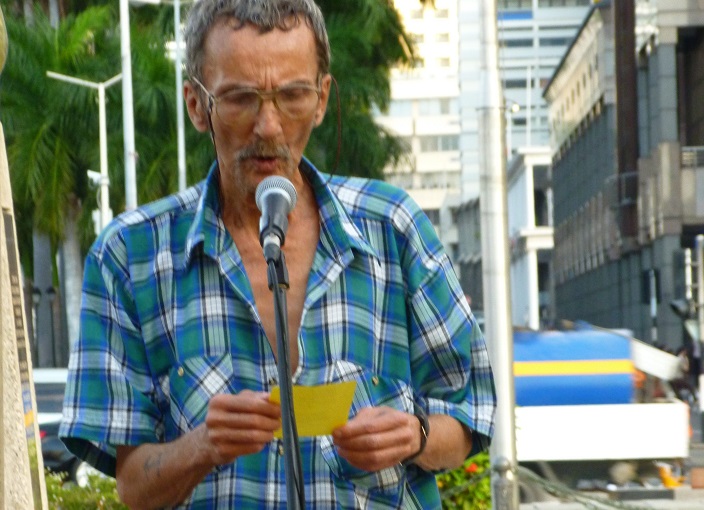Mauritius: Homeless Shelter Residents Speak Out

This past week saw the death of one of the men who lived in the homeless shelter of Port Louis, Mauritius. Noel had been an active member of the Committee for the World Day for Overcoming Poverty since its creation. In order to prepare this year’s observance of that event on 17 October, he joined with other residents of the shelter to write a collective testimony. In particular, he contributed this reflection: “Wherever there is exclusion, our human rights are not being respected at all. This word ‘exclusion’ should never have been brought into existence. Many people say that there is great progress everywhere; but there are always some people being left out. It is the people who suffer these situations who know what they have to go through.”
Below is the full text of the testimony that other shelter residents will read on 17 October as a tribute to the memory of Noel.
Development exists, but there is currently not enough for everyone. Give us the chance to make our own contributions
“We, the temporary residents of the ‘Abri de Nuit’ shelter, must live here for one reason: a lack of housing. We are living here only for the time being, waiting until we are able to find a solution to our problem.
“We would like to call on the community to address this problem of housing.
“Development is occurring, but not everyone benefits from it.
“We see that where there is exclusion, our human rights are not being respected. This word ‘exclusion’ should not even exist. The very idea of excluding some people shouldn’t exist.
“People say that development is moving ahead at full speed; but there are always people being left out. It is those people living in deep poverty who know this better than anyone else.
“Temporary housing has been built at the foot of the mountains. Each time it rains, there are landslides and the homes collapse. How many people have died because of the torrential rainfalls? And yet those very buildings were built as a project of ‘development’. We have ‘development’, but it’s sustainability that matters.
“Home ownership would mean getting a twenty-year mortgage. But our jobs don’t last long. So after two or three years of debt, we end up here in this shelter. In our country, most manual workers don’t even have jobs. Employers don’t hire us because they hire immigrant workers instead. Why? Is it because they are cheaper? Because they make them more money? Because they work overtime? We don’t even know.
“What about a person who has done time in prison and wants to change his life. To do that, you need work. But employers say, ‘No, we’re not interested in hiring anyone disreputable.’ Today, everything is about ethics — but don’t we also need to earn money? Everyday we need money to survive. Everything costs money. That’s why, after years of being turned away, some people feel forced to resort to robbery. So all of us are looked at as outlaws. Others may fall into depression, alcoholism, or addiction….
“Sometimes, even if there is work for us, the pay is so low that you lose heart. There are even some places that we are not even allowed to enter if have only flip-flops on our feet [instead of proper shoes].
“This is why we say that development is not working for us. We don’t benefit from it at all. Fifty percent of people like us are in prison. All that matters is the letter of the law. Even if we speak too loudly we may be thrown back in jail. But what is very rare is that two people sat with us to listen to what we have to say to help us prepare our message for this event. Elsewhere, no one takes time with us like that, it just doesn’t happen.
“Sustainable development doesn’t work for everyone. For some, yes it works. But it should work for everyone not just a few.
“We are confident that the government can change the ways things are, for they have the power in their hands and are aware of our situation. For example, whenever there is a cyclone, the government, through the prime minister’s relief fund, helps those affected. We think that the state can ask the private sector to contribute a certain sum of money each month to that relief fund as a way to help overcome poverty too.
“As long as people must rely on charity, it will not be easy to truly overcome poverty. If we think negatively, we will always have difficulties, so we must keep a positive attitude. What we have to do is collaborate, put our heads together, and unite our efforts to create sustainable development that benefits all, instead of one where only a few people get more than their share.
“In order to build our future, we want to put our own mark on a new kind of sustainable development for all.”

